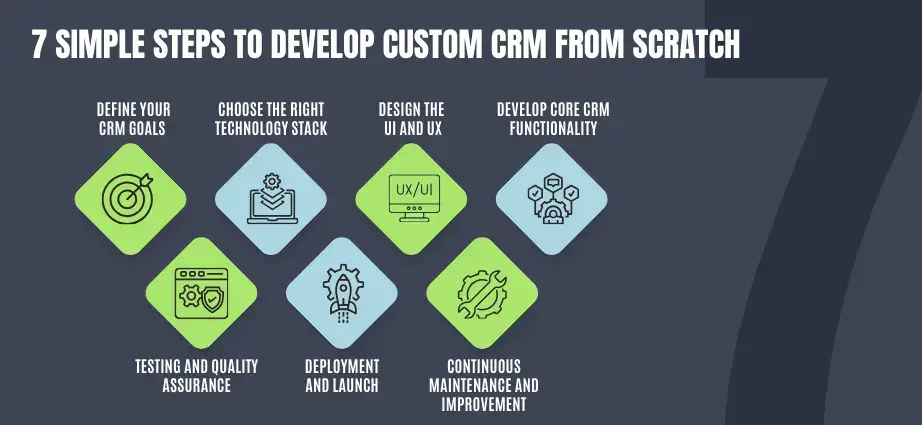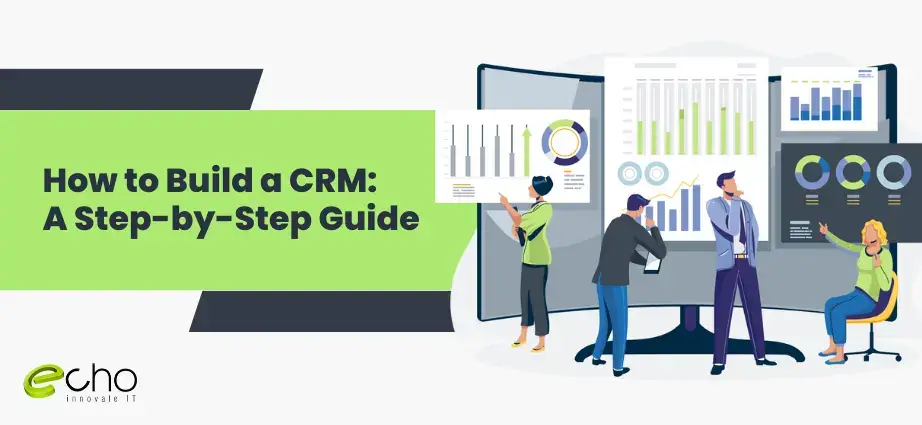CRM (Customer Relationship Management) is a strategy firms use to manage customer relationships. It’s similar to a system that lets businesses keep track of who their customers are, what they’ve purchased, and how satisfied they are. This information strengthens client relationships, increases revenue, and delivers better service. A well-designed CRM allows you to understand your consumers better, resulting in more tailored and successful interactions. CRM software will enable you to close deals faster and more efficiently by tracking prospects, managing sales pipelines, and automating processes. CRM software can help to streamline your business procedures, saving time and resources. Centralized client information simplifies data access and analysis, allowing you to make more informed decisions. CRM may assist you in retaining existing customers and increasing loyalty by offering outstanding customer care and knowing their demands.
When learning how to build a CRM system from scratch, it’s important to remember that every business will need to customize the system to fit its unique needs. How you segment customers, the type of data you want to track, and the other software you plan to integrate will all be tailored specifically to your business.
While you may receive valuable assistance from the vendor in building the system, on day one, all CRM software is essentially a blank canvas that each company adapts in its own way. Customer relationship management (CRM) systems are not for everyone, and creating one can take time, but it has become significantly easier compared to just a few years ago. This guide covers all the key steps on how to build a CRM system or CRM database and explores the options available for effective CRM management software.
Building a Custom CRM System: The Ultimate Guide to Transforming Business Processes
Customer Relationship Management (CRM) systems are indispensable tools for businesses aiming to streamline operations, manage customers effectively, and drive growth. Whether you’re looking to create a custom CRM from scratch or seeking alternatives to popular platforms like Salesforce and HubSpot, this guide will cover all aspects of CRM development, features, integration, and industry-specific solutions.
What is a CRM System?
A CRM system is a software platform designed to manage customer data, sales processes, and business interactions. By integrating analytics, contact management, and sales pipeline tracking, a well-developed CRM system improves customer satisfaction and enhances business efficiency.
Why Build a Custom CRM System?
While off-the-shelf CRM platforms like HubSpot or Salesforce are widely used, they may not cater to the unique needs of every business. Here’s why companies opt for custom CRM development:
Customizable Features: Tailor the system to specific business processes.
Scalability: Adapt the platform as your business grows.
Cost-Effectiveness: Avoid paying for unnecessary features.
Integration: Seamlessly integrate with existing tools like social media, sales pipelines, and project management software.
Steps to Build a CRM System from Scratch
Define Business Needs: Start by analyzing your sales processes, customer data management requirements, and project management needs.
Choose the Right Platform: Decide whether to use an open-source framework or develop a custom app.
Design CRM Features:
Contact Management: Centralize customer data for easy access.
Sales Pipeline Tracking: Visualize and optimize sales processes.
Analytical CRM: Use data-driven insights to improve customer satisfaction.
CRM Integration: Connect with social media, email marketing tools, and other platforms.
Develop the CRM: Collaborate with a skilled software development team to bring your vision to life.
Test and Implement: Ensure the system functions as intended and train your sales team.
Iterate and Improve: Continuously refine the system based on feedback.
Top CRM Features to Include
Customer Data Management: Store and organize customer profiles, interactions, and purchase histories.
Sales Pipeline Management: Track deals through every stage of the sales funnel.
Analytics and Reporting: Gain actionable insights from customer and sales data.
Social Media Integration: Engage with customers across platforms.
Customizable Dashboards: Personalize views for sales teams and managers.
Automated Workflows: Streamline repetitive tasks.
Industry-Specific CRM Solutions
Healthcare CRM: Focused on patient management and compliance.
Retail CRM: Tailored for inventory tracking and customer loyalty programs.
Real Estate CRM: Designed for property listings and client management.
Manufacturing CRM: Optimized for supply chain and vendor relationships.
Financial Advisor CRM: Secure tools for client portfolio management.
HubSpot and Salesforce Alternatives
Looking for free Salesforce competitors or HubSpot alternatives? Consider these platforms:
Zoho CRM: Affordable and feature-rich.
Freshsales: Intuitive with AI-driven insights.
Insightly: Ideal for project management integration.
Bitrix24: Free plan with robust features for small businesses.
CRM Integration Best Practices
A successful CRM implementation relies on seamless integration with existing tools:
CRM Software Integration: Ensure compatibility with email, project management, and marketing platforms.
Training: Equip your sales team to leverage the new system effectively.
Customization: Adapt workflows to fit specific needs.
Examples of CRM Systems in Real Life
HubSpot: Known for inbound marketing features.
Salesforce: The go-to platform for enterprise-level CRM.
Pipedrive: Simplifies sales pipeline management.
Monday.com: A blend of project management and CRM.
The Importance of CRM for Business Growth
Building a CRM system empowers businesses to:
Streamline contact management.
Enhance customer satisfaction.
Optimize sales team performance.
Improve decision-making through analytical CRM tools.
Top Features To Add In Your CRM Software
- Contact Management: Save and organize customer information, including contact information, company profiles, and communication history.
- Lead Management: Follow potential clients from first inquiry to conversion by automating lead scoring and assignment processes.
- Sales Pipeline Management: Visualize the sales funnel, track deal progress, and establish reminders for follow-up.
- Customer Support: Effectively manage client queries, complaints, and support tickets, resulting in faster response times and more customer satisfaction.
- Marketing Automation: Automate repetitive marketing processes such as email campaigns, social media scheduling, and lead nurturing to save time and improve efficiency.
- Reporting and Analytics: Use customizable reports and dashboards to gain valuable insights into your CRM data, including critical metrics such as conversion rates, client lifetime value, and sales success.
- Document management: entails storing and organizing critical client papers like contracts, proposals, and invoices within the CRM system.
- Integration with Other Systems: Your CRM can be seamlessly integrated with other company tools such as email, calendar, accounting software, and marketing automation platforms to streamline workflows and eliminate data silos.
- Customization Options: Create custom fields, processes, and reports to tailor your CRM to meet your business requirements.
- Artificial Intelligence (AI): Use AI development and powerful features such as predictive analytics, natural language processing, and chatbots to automate activities, improve customer service, and acquire a better understanding of customer behavior.
- Easy Mobile Access: Make sure your CRM is mobile-friendly so salespeople can stay connected and handle client interactions while on the go.
5 Best CRM Systems To Know About
While creating a custom CRM can provide personalized benefits, it’s essential to investigate existing choices to see whether they meet your specific requirements. Here are five prominent CRM platforms that you should examine before starting a bespoke development project:
- Salesforce: Salesforce is a popular CRM platform noted for its powerful features, scalability, and diverse ecosystem of apps and integrations. Salesforce provides various features, including contact management, sales pipeline management, marketing automation, and customer care.
- Hubspot: HubSpot is a prominent marketing, sales, and customer support platform. HubSpot offers a straightforward UI, extensive automation tools, and a free plan for small enterprises.
- Zoho: Zoho CRM is a complete solution focused on cost and flexibility. Zoho provides various services, such as contact management, sales pipeline management, email marketing, and project management.
- Microsoft Dynamics 365: Microsoft Dynamics 365 is a cloud-based CRM application that integrates with the Microsoft Office suite. Dynamics 365 has several modules: sales, customer service, marketing, and field service.
- Pipedrive: Pipedrive is a graphically appealing CRM tool that aims to streamline sales operations. Pipedrive focuses on pipeline management, deal monitoring, and activity management, making it an excellent solution for sales-oriented organizations.
Why Creating a CRM System Is Worth It
While ready-made CRM systems are convenient, they are designed for broad audiences, offering a wide range of features that may not be tailored to your specific business needs. By creating a custom customer relationship management (CRM) system, you can completely transform the way you handle client relationship management from start to finish.
With a custom CRM platform, you can include only the features you need, avoiding the bloat of unnecessary tools found in pre-built CRM softwares. This customization allows you to focus on what truly matters to your business, making it potentially the best CRM for small businesses seeking efficiency and precision.
One key advantage of building your own CRM is data security. Custom customer relationship management software lets you implement advanced security measures without relying on vulnerable third-party plugins or outdated source code. This ensures your system is as secure as possible, reducing risks common with generic relationship management software.
While some ready-made CRMs offer open APIs, a custom solution gives you the freedom to integrate even the most complex tool stacks, including outdated apps that standard CRM platforms often overlook. Additionally, a custom CRM makes it easier to connect multiple departments to one cohesive, standardized system—something cookie-cutter CRMs may struggle to achieve.
Overall, a custom CRM gives you complete control over every aspect of your customer relationships, from managing interactions to enhancing customer service. This level of flexibility and creativity allows you to build a system that works exactly how you want, something that’s not possible with pre-built CRMs designed for the masses.
7 Simple Steps To Develop Custom CRM From Scratch

Building the best CRM for small business or large company involves several key steps. Let’s understand each step in detail:
Define Your CRM Goals
Conduct a thorough review to discover pain spots, inefficiencies, and places where a CRM might provide value. Analyze your present procedures, data management techniques, and customer contacts to determine the specific functionality you require. Consider the following: contact management, lead creation, sales pipeline management, customer service, marketing automation, reporting, and analytics.
Prioritize these characteristics according to their importance to your business operations. Make sure your CRM is built to support future growth and changes. Consider data volume, user base, and potential integration with other systems. A scalable CRM enables you to develop and adapt as your firm expands.
Choose the Right Technology Stack
Agile and Waterfall are two popular methodologies for agile software development. Agile emphasizes iterative development, flexibility, and collaboration, whereas Waterfall follows a linear approach with distinct phases. The best methods for your CRM development project will depend on factors such as your requirements’ complexity, uncertainty level, and your team’s preferences. If your project involves frequent changes, uncertain requirements, or a collaboration.
Design The UI and UX
A well-designed user interface (UI) is essential for a successful CRM. It should be intuitive, visually beautiful, and simple to use. A user-friendly design boosts user satisfaction, increases productivity, and lowers the likelihood of errors. Wireframes are low-fidelity graphic representations of your CRM’s layout and structure. Prototyping, on the other hand, entails creating interactive mockups that reflect the actual user experience.
These strategies assist you in visualizing the CRM’s design, identifying potential usability concerns, and gathering feedback from stakeholders before investing in development. Consider accessibility features for users with disabilities, such as screen readers, keyboard navigation, and color contrast. A mobile-friendly and accessible CRM allows users to interact with your system from any location, increasing convenience and inclusivity.
Develop Core CRM Functionality
Customer relationship management (CRM) systems are designed to streamline how you manage client interactions and improve business processes. Analytical CRM tools help analyze customer data to provide actionable insights. Building a CRM system or creating a custom CRM allows businesses to tailor features to their specific needs. Contact management helps store and organize customer information, while lead generation tools, including b2b lead generation tools free, assist in identifying and capturing potential customers. A sales pipeline tool visualizes the sales process, enabling you to track leads through various stages and calculate conversion rates. Additionally, client relationship management features, like customer support, ensure smooth communication and effective problem-solving, ultimately boosting customer satisfaction.
To enhance your CRM software, consider adding new functionalities such as marketing automation, which can automate repetitive marketing tasks, personalize campaigns, and track their effectiveness. Integrating reporting and analytics features into your CRM management software provides insights into customer behavior, enabling you to monitor performance, detect trends, and make informed decisions based on data. A customizable CRM platform ensures your CRM can be tailored to fit your specific business requirements. Whether you need a custom CRM system or are exploring hubspot alternatives and salesforce competitors, building a CRM system from scratch or opting for CRM software integration can significantly improve how you manage customers. CRM implementation best practices, including seamless integration with social media and project management tools, make your CRM an essential asset for driving sales team efficiency and overall business success.
Testing and Quality Assurance
Rigorous testing is required to guarantee that your CRM works as intended, is bug-free, and meets the highest quality requirements. A well-tested CRM increases user satisfaction, prevents data loss, and reduces downtime. Test individual CRM components or modules to ensure their correctness and operation. Test the complete CRM system to ensure it meets the specifications and works as expected.
Allow end users to test the CRM in real-world circumstances to ensure that it satisfies their needs and expectations. Implement a rigorous quality assurance procedure to detect and correct flaws early in the development cycle. Use bug tracking tools to monitor and handle reported issues, ensuring they are resolved quickly and effectively.
Deployment and Launch
Choose the deployment strategy that best fits your company’s needs and technological infrastructure. On-premises deployment means hosting the CRM on your servers, whereas cloud deployment uses a third-party cloud provider. Consider scalability, security, and pricing while making your decision.
If transferring data from an existing CRM system, create a detailed data migration plan to ensure a successful transition. Implement robust security measures to secure sensitive consumer data, such as encryption, access limits, and regular backups.
Continuous Maintenance and Improvement
Apply updates and patches regularly to fix bugs, improve features, and increase security. Staying up to speed with the latest versions will help to prevent vulnerabilities and keep your CRM effective. Following launch, your CRM will require regular support and maintenance to resolve issues, assist users, and keep the system operational.
Provide extensive training to your team so they can use the CRM properly. Create user manuals, tutorials, and knowledge base articles to assist users and address common questions.
Cost of Developing A CRM System
The cost of establishing a CRM system varies greatly depending on several criteria, including required features, complexity, development technique, and technology stack. It’s crucial to note that while building a CRM can be expensive, the long-term rewards for increased productivity, customer happiness, and sales growth can far outweigh the initial expenditure. By carefully examining these variables and collaborating with competent developers, you can design a CRM system corresponding to your company’s goals and budget.
As an approximate estimate, below are some possible cost ranges:
| CRM Type | Price Range |
|---|---|
| Basic CRM | $10,000 - $30,000 |
| Medium-sized CRM | $30,000 - $80,000 |
| Enterprise-level CRM | $80,000 or more |
Conclusion
Building a custom CRM system requires a significant investment, but the advantages outweigh the price. Following the main stages suggested in this article, you can make a powerful tool that streamlines your business processes, improves customer interactions, and promotes expansion.
Echoinnovate IT, an established Software development company
for over a decade, specializes in creating customized CRM solutions to help organizations improve customer connections, manage processes, and drive growth. Get a more precise price from our CRM development professionals, or request a proposal.
FAQs
What is the first step in building a CRM?
The first step is to define your CRM requirements by identifying the key features and functionalities you need to meet your business goals.
How do I choose the right CRM platform?
Evaluate CRM platforms based on factors like scalability, customization options, integration capabilities, and user-friendliness. Consider both off-the-shelf solutions and custom-built options.
What should be included in a CRM design?
A CRM design should include user interface layout, data fields, workflows, and integration points. Ensure it aligns with your business processes and user needs.
How do I migrate data to a new CRM?
Plan data migration by mapping existing data fields to CRM fields, cleaning up data, and using data import tools provided by the CRM platform. Test the migration with sample data before full-scale implementation.



